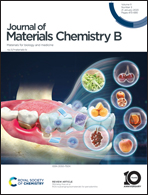Gradient hydrogel actuator with fast response and self-recovery in air†
Abstract
The driving principle of a thermal-responsive hydrogel that loses water at high temperature and absorbs water at low temperature limits its application in an aqueous environment. Here, a gradient hydrogel actuator was developed by introducing sodium hyaluronate into poly(N-isopropylacrylamide) hydrogel by an asymmetric mold method. The hydrogel exhibited a fast response above the LCST in air and unusual self-recovery without the need for further temperature stimuli. The actuation behavior was related to conversion from free water to bound water and water retention within the gradient matrix. The self-recovery mechanism was explored. This work provides a new insight into designing bionic hydrogels applied in a non-aqueous environment.



 Please wait while we load your content...
Please wait while we load your content...